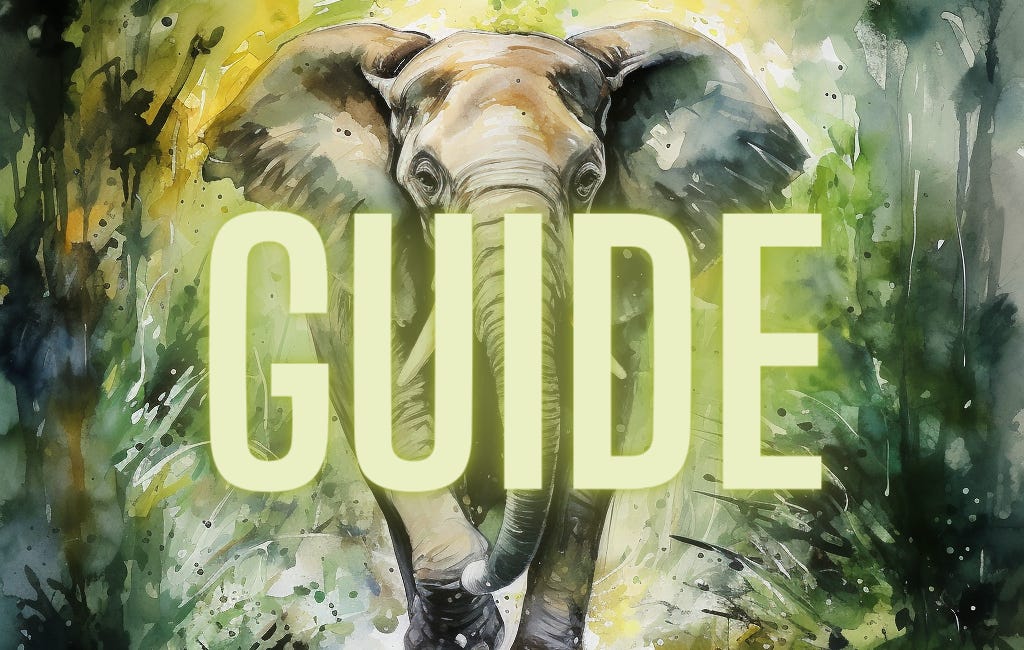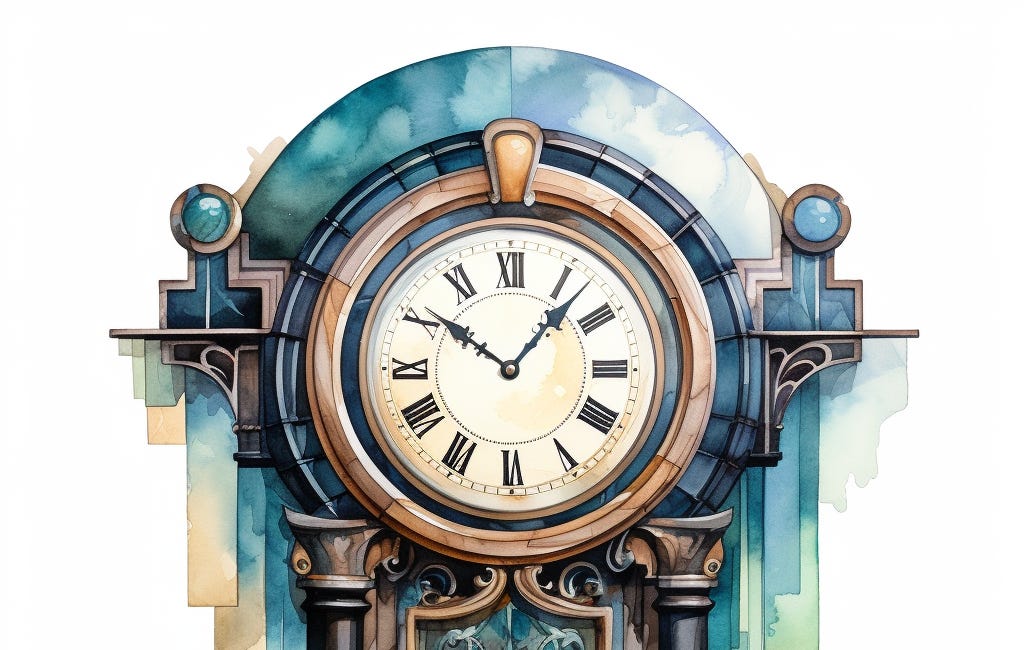Hello fellow Substackers,
We're happy to have you all here and truly appreciate your presence! Another week has passed, and our publication, Eszter’s Weekly Elephant, is gaining more readers every day! This brings us immense pleasure. Having you appreciate and love our articles, short stories, guides, essays, and other content means the world to us! So, let's dive in!
Many ask why we need to deal with processing our childhood traumas and understand and resolve those family system correlations, of which we all have plenty in our subconscious. The question always is, what tangible benefits derive from this work?
Answering this question isn't easy in just one sentence, but I'll try to illuminate the essence. To make this clearer, we need to start a bit further back than simply examining the traumas we've suffered.
Recently, more and more research and empirically obtained information are coming to light, proving that our minds and the programs running in them indeed influence the world around us.
Consider the famous, often-repeated Double Split Experiment, for which one interpretation by Carlo Rovelli, a theoretical physicist, suggests that the observed electron in the experiment does not have a characteristic behavior or property, but rather, its behavior and properties depend on the observer's expectations. Those interested in learning more about this experiment can easily research what it entails. Suffice it to say, whether light behaves as a wave or as a particle appears, at least according to the aforementioned theoretical physicist, to depend on what the experiment's observer expects from it.
In addition to this experiment, it has also been proven that quantum entanglement exists, meaning that two particles, completely separated from each other (to the extent that even the flow of information at the speed of light is not possible between them), still respond to the other's movement or change in properties. If this is the case, then it's evident that there are far more connections and correlations in the world than we can grasp with so-called common sense, recognizing only the visible, tangible world.
Quantum physics is still considered a relatively young science, and I have a sneaky suspicion that, because it completely upends the cemented principles of traditional physics, it's not easy to get those laws, explanations based on observations, that researchers suspect and strive to prove, accepted. Moreover, I'm confident that many research findings don't see the light of day as far as the general public is concerned, because a total paradigm shift would disturb the majority of people. Moreover, we know that when any revolutionary research result is born, the first thing is to secretly examine how it can be weaponized, then see how the findings would affect people, and only then are they made public. In short, I'm sure that researchers know much more about how our minds influence our world and our experiences than they show us, mere mortals.
When I think of this, I always remember my husband's loud laughter when I read to him that the department of ethology had finally proven with scientific experiments that dogs have feelings. He laughed and said that such research was unnecessary, enough to have a dog and observe the animal. Of course, he's right; human knowledge for long centuries has not accumulated based on laboratory research but through empirical experiences, yet precise research also has its place. However, we should never forget about our own observational and analytical abilities, which can help greatly in understanding the world and finding solutions.
So, although no one has scientifically proven yet that we can influence our world with our minds, there are numerous observations indicating that indeed, how we relate to the world around us matters.
For instance, it's a common phenomenon that when you're considering buying an Audi, suddenly you start noticing Audis everywhere, much more frequently than before. Whether this is because the mind "creates" Audis as an experience or because Audi has shifted into the category of essential information in the mind, leading the brain to consciously register such brand cars, is a significant question. Regardless, the fact remains the same, independent of the reason. When we focus on something, we generally tend to notice it more.
This principle underscores the importance of recognizing the impact of the human mind on our lives. As I've previously mentioned, the cause is secondary; the effect is what truly matters. The focus amplifies the subject of our attention.
This mechanism works similarly to social media algorithms. If someone clicks on a cute cat video once, or even likes it, they are then inundated with cute cat videos and related advertisements, like cat food, cat beds, or cat toys, in their feed for weeks. If these are ignored for a while, the cat-related content disappears, making room for whatever else captures our interest.
This brings us to an intriguing point. It's easy to fall into the mindset that the workings of the world are straightforward. If we seek health, focusing on health should suffice; if we desire a happy relationship, concentrating on that should do the trick; if we want more money, envisioning dollar signs should be enough. However, there's a catch. In my experience, the problems we encounter often arise because we've focused on them, albeit on a subconscious rather than a conscious level. After all, who would consciously focus on problems just to bring more of them into their lives? There's usually an unconscious element in our minds that highlights a specific issue, just as thinking about buying an Audi leads us to notice Audis everywhere.
Without identifying the hidden program in our minds that directs our focus toward a particular illness, financial dilemma, or relationship issue, merely attempting to consciously concentrate on better health, a fulfilling relationship, or increased wealth will prove ineffective. Among the two conflicting programs – the conscious "positive" program and the subconscious "negative" program – the latter invariably prevails. This is because it operates continuously, whereas the conscious program only runs as long as we actively pay attention to it.
To demonstrate this point, let's conduct a brief experiment. I invite the reader to consciously focus on taking deep breaths and continue reading with this in mind. We'll revisit this concept shortly, but let's proceed with our discussion for now.
Thus, if the problematic program operates the majority of the time, the "positive" program stands little chance of assuming control, as any of its potential outcomes are quickly negated by the opposing program.
Consequently, if we're faced with a situation or challenge we wish to alter, the most rational approach is to unearth the underlying program that repeatedly places us in the same undesirable circumstances or causes us to continuously notice Audis everywhere.
A quick question for the reader: Are you still focusing on deep breathing? Likely, it's been forgotten by now, right? This exemplifies the challenge of sustaining a "positive" program against a habitual "negative" program. Initially, we might manage to concentrate on the "positive" program, but eventually, it fades, and we revert to our default programming.
This is why gaining insight into the workings of our subconscious and addressing the traumas, beliefs, and suppressed emotions housed within is so crucial. These elements constitute the subconscious programs that generate issues in our lives.
Beliefs such as familial patterns of early death from cancer among women, all men being villains, or the wealthy being malevolent and frightening, all obstruct our path to a happy, fulfilled existence. Our lives may be influenced by a plethora of beliefs and fears, not solely based on personal experiences but also due to traumas inherited through the family system.
Many hope for this, but unfortunately, it's not enough to simply consciously contradict these beliefs because persuasion and logical arguments don't work with the subconscious. The subconscious resembles a sulky child who sobs and rages, and adults need to figure out what's really behind their behavior because until then, the child won't cooperate. Deep self-knowledge work serves precisely this purpose: to uncover which subconscious beliefs, programs, and repressed emotions overshadow our well-intentioned conscious programs. If we succeed, the new, healed program will also run in the subconscious, resolving the problem.
I hope, albeit a bit lengthy, I've managed to illuminate why I believe self-awareness work is so crucial. The articles, stories, guides, and essays featured in Eszter’s Weekly Elephant aim not only to help more people grasp the importance and purpose of this work but also to offer knowledge that enables us to understand our subconscious. They help us confront feelings we've previously chosen to ignore. By releasing these repressed emotional blocks and understanding the reasons behind our subconscious programs, the "negative" programs can be rewritten. Unless we're willing to emotionally feel and mentally understand the circumstances and reasons behind the "negative" programs’ formation, we'll achieve results as transient as those related to deep breathing demonstrated earlier.
So, let’s move on to this week's highlights in Eszter’s Weekly Elephant
We explored topics that resonate with many and might even be triggering. One issue is the militarization of children in relationships, a sadly common occurrence. Sentences that generalize and condemn men or women, as well as those specifically targeting a parent, cause significant pain and present a tough dilemma for a child. The article "Choosing Between Parents" delves into why this is.
This week, one of my favorite stories, "The Elephant," was released as paid content. However, the accompanying guide, as well as a long preview of the short story, is accessible to free subscribers. Reading the story can awaken repressed emotions related to forsaking our dreams, reigniting the youthful vigor we once hoped to use to fulfill them. For those aiming to further enhance and consciously process the effects sparked by the story—to rediscover where along their journey they lost something and wish to reclaim lost dreams and the vitality required for their realization—reading the guide associated with the story is recommended. The posed questions aid in retrieving and embracing our scattered treasures.
In the Beyond the Book category, I’ve offered my personal reflections on Elizabeth Gaskell’s "North and South." As always, expect insights that reflect my perspective on the book rather than a conventional review or analysis. I thoroughly enjoyed this book and even the series based on it, believing it offers valuable lessons on how to reconcile two entirely different worlds. It’s worth a read!
This brings us to this week's content for paid subscribers. Your support means a lot!
Additionally, this week I addressed a topic of keen interest to many: infidelity and its underlying causes. Though infidelity typically results in painful experiences, understanding the complex backgrounds beyond initial appearances is crucial. Viewing the situation from this angle can lessen the pain and provide insights on resolving these painful issues. This isn’t about absolving the unfaithful party but about understanding the reasons, learning, and amending relationship dynamics to facilitate healing or prevent similar issues in future relationships.
As for this week's story, "The Elephant," it holds a special place in my heart. For those who read it, it awakens a strength that often lies dormant, a flickering force lost amidst life's whirlpools. Many have shared how liberating it was to read this story, how it inspired dreams, and how it rejuvenated their zest for life after delving into the tale of Stella and Mina, the two friends. I hope it brings you joy as well!
For those who savor literary morsels, these brief bonbons of just one hundred and fifty words, don't overlook the piece titled "Mercy"! It's a rewarding read!
Thank you for being here with us!
We hope that this week we've again provided you with intriguing insights and captivating stories!
Thank you for regularly reading Eszter's Weekly Elephant. We are thrilled that you find our content compelling and hope to welcome you among our paid subscribers!
Your support is invaluable; it truly fuels our passion! :)
Warm regards,
Disclaimer: The content in our publications should not be considered professional psychological or psychiatric advice. Thus, everyone reads the posted writings and applies their content at their own risk.
Home | Notes | Articles | Eszter’s Magic | Literary Bonbons | Short Stories and Guides | Beyond the Book | EWE Issues | Archive | About










